|
|
|
Sort Order |
|
|
|
Items / Page
|
|
|
|
|
|
|
| Srl | Item |
| 1 |
ID:
142820
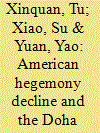

|
|
|
| 2 |
ID:
088933


|
|
|
|
|
| Publication |
2009.
|
| Summary/Abstract |
This article addresses the conflict over the Euphrates and Tigris waters from the perspective of negotiation theories, by examining the role of power in upstream/downstream negotiations. Conceptual and empirical links are established between water, negotiation (structure, process), power (asymmetries, coalition dynamics, strategies, development of alternatives) and security (direct/indirect interests such as national security, border security, territorial claims, economic development and environmental concerns). The study concludes that asymmetries in power have favored upstream/downstream interactions towards bilateral if not basin-wide arrangements. The framework shows that traditional elements of power, such as upstream positions, military and economic resources, do not constitute the only sources of power. Bargaining power can also determine the dynamics between respective riparians. Time constitutes an important source of power, and interests vary over time when political settings and security concerns shift. Downstream or more vulnerable riparians can invert situations of power asymmetry by acting on the basin-dominant riparian's interests and thus reduce its alternatives. Syria's use of 'issue-linkage' in its interactions with Turkey over water and wider security issues serves as the primary example.
|
|
|
|
|
|
|
|
|
|
|
|
|
|
|
|
| 3 |
ID:
176546
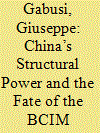

|
|
|
|
|
| Summary/Abstract |
In 2013, China and India officially established an economic corridor (the Bangladesh–China–India–Myanmar Economic Corridor, BCIM-EC) that would cut across Myanmar and Bangladesh. But while the formal process of cooperation among the four countries is in place, many obstacles to its implementation remain at the international, national and local levels. Is meaningful collaboration possible within the BCIM-EC framework? In terms of two dimensions of structural power as conceptualised by Susan Strange, security and trade, China’s structural power in Myanmar is much stronger than India’s. It is therefore likely that this imbalance will prevent the BCIM-EC project, which currently appears to be overshadowed by China’s Belt and Road Initiative, from having a fruitful outcome.
|
|
|
|
|
|
|
|
|
|
|
|
|
|
|
|
| 4 |
ID:
140773
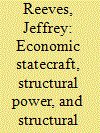

|
|
|
|
|
| Summary/Abstract |
This article employs the concepts of structural power and structural violence to a undertake critical study of China’s use of economic statecraft toward Kyrgyzstan. The article argues that China’s reliance on economic exchange to secure its strategic ends in Kyrgyzstan has resulted in asymmetric economic exchange between the two states. Through this asymmetric exchange, China has gained influence over Kyrgyzstan’s domestic structures. Chinese structural power, in turn, contributes to violence across Kyrgyzstan’s structures of economy, environment, and society and within the country’s state-society relations. Structural violence within Kyrgyzstan also results in periphery instability and domestic insecurity for China. As such, the article argues that China’s use of economic statecraft to achieve its strategic aims in Kyrgyzstan is self-defeating.
|
|
|
|
|
|
|
|
|
|
|
|
|
|
|
|
| 5 |
ID:
151645


|
|
|
|
|
| Summary/Abstract |
The prediction of America’s decline is a regularly recurring phenomenon; this also pertains to the pivotal field of global finance. This article argues that, first we have to consider the United States together with the other Anglophone countries. The English-speaking countries and territories – Anglo-America – have deep common political and socioeconomic roots, of which the unique global Five Eyes intelligence cooperation is merely one manifestation. In finance, New York and London (NY-LON) constitute the decision-making core of this transnational formation. Second, to analyse the highly complex phenomenon of structural power in the globalised international political economy we have to dig deeper to uncover truly meaningful data. Thus, this article evaluates data for nine central segments of global finance from around the year 2000 to 2014. Contrary to the assertions of many declinists, these data show that Anglo-America’s dominant structural power has been persistent during this period. Moreover, four novel visualisations show that the US-UK axis is the fulcrum of the international financial system. However, contemporary global finance is characterised by a high degree of latent fragility; significant imbalances, inequalities and contradictions persist and are even likely to grow, potentially undermining the legitimacy and the stability of the whole system.
|
|
|
|
|
|
|
|
|
|
|
|
|
|
|
|
| 6 |
ID:
170608
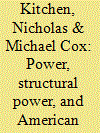

|
|
|
|
|
| Summary/Abstract |
Over the past twenty years, debates surrounding American power have oscillated between celebrations of empire and laments of decline. What explains such wild fluctuations? This article argues that the power shifts debate rests on an underpinning concept of power based around relative capabilities that is theoretically not fit for purpose. We propose instead an approach to power shifts that locates power primarily in structural power. In doing so we show that developments in the character of the international system render structural advantage more significant to questions of international leadership than the balance of national capabilities. These developments also mitigate against systemic changes that might bring relative strength and structural position into greater alignment.
|
|
|
|
|
|
|
|
|
|
|
|
|
|
|
|
| 7 |
ID:
120381
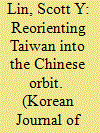

|
|
|
| 8 |
ID:
158048
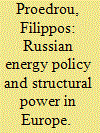

|
|
|
|
|
| Summary/Abstract |
This article discusses and critically evaluates the impact of the Russian gas strategy through the theoretical lens of power. I delineate different kinds of power and discuss within which forms of power the Russian gas strategy analytically falls. In doing so, I move away from simplistic understandings of ‘hard’ and ‘soft’ power in energy politics and focus on the discussion of structural power, exploring agenda-setting functions, the rules of the game, regulatory issues, economic parameters, and the impact of globalising markets. I conclude that these factors have suppressed Russian structural power and the success of Russian energy policy in Europe.
|
|
|
|
|
|
|
|
|
|
|
|
|
|
|
|
| 9 |
ID:
155475


|
|
|
|
|
| Summary/Abstract |
What is the utility of US military power when seeking to generate international economic arrangements preferential to its national interests? Conventional theories of relational power, whereby actor A compels actor B against their own will, offers a narrow range of explanations. We argue that theories of structural power, whereby an actor can utilize positional advantages to shape the structural contexts of other states international preferences offers a more nuanced account of the close interaction between geopolitics and the global economy. We taxonomize structural power into positive and negative components, applying these to a case-study of regional American primacy in east Asia. We argue that US primacy has allowed it to leverage its military power into generating political–economic institutional outcomes that have reinforced its broader leadership role. The US may well continue its deep engagement or follow a path of retrenchment under President Trump, but both grand strategic options will impact on its capacity to leverage such structural power and have implications for US hegemony and the region's political economy.
|
|
|
|
|
|
|
|
|
|
|
|
|
|
|
|
| 10 |
ID:
131953
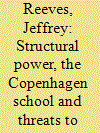

|
|
|
|
|
| Publication |
2014.
|
| Summary/Abstract |
This article engages with current debates surrounding China's security by employing the concept of structural power and the Copenhagen School approach to security studies to measure threats to China's security. Building on existing Chinese and English language research on China's security drivers, the article develops a mechanism for determining how China's economic relations with small states in Asia negatively affect their domestic stability and how this instability then loops back to undermine China's strategic position. The article uses China's relations with Cambodia, Nepal and Mongolia as case studies.
|
|
|
|
|
|
|
|
|
|
|
|
|
|
|
|
| 11 |
ID:
187475
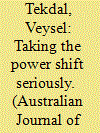

|
|
|
|
|
| Summary/Abstract |
It is widely agreed that recent decades have witnessed a power shift towards the emerging economies. Yet the magnitude of the power shift and its implications for the global economic order are much contested. For some, the diffusion of power has been changing the power relations between the global North and global South as well as within the global South. For others, the emerging economies do not pose a significant challenge to the global North’s dominance in the global political economy as the latter continues to hold structural power advantages in technology, finance, and institutional capacity. This paper contributes to this debate by analysing the changing power relations in the field of development cooperation. As shown by recent work, Chinese development finance, combining a massive scale, global reach, and distinctive modalities, has reshaped the global landscape of development finance. This paper offers an interpretation of this transformation with a focus on power relations. It argues that Chinese development finance has not only decreased the ability of Western development finance institutions to influence policy agendas and preferences in the developing world, but also eroded the latter’s power to shape the governance, norms, and modalities of development cooperation.
|
|
|
|
|
|
|
|
|
|
|
|
|
|
|
|
|
|
|
|
|